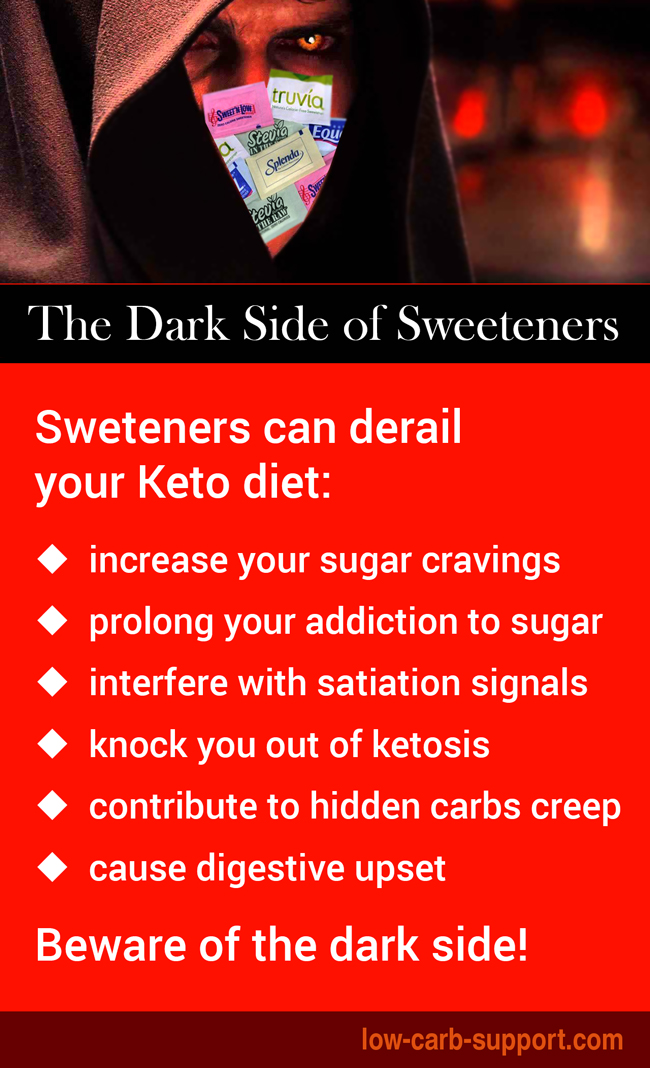
Do you often indulge in low-carb cakes, Keto bars and other sweet treats? Well, they are sugar-free – so it’s not a problem, right?
Unfortunately, that’s not always the case – at least for some of us.
We are all different. Sweeteners and similar products can have adverse effects on some of us, but none whatsoever on others.
So ask yourself – how is your diet going? If your weight loss is progressing well and you feel good overall – then you have nothing to worry about.
But if your weight loss is stalling, if you keep falling out of ketosis, or if you are struggling with strong sugar cravings or tiredness – it’s time to evaluate what’s going wrong.
The cause of several common low-carb diet problems can be traced back to sweeteners and other artificial low-carb substitutes.
Low-carb products – caution required
Low-carb diets are rising in popularity. As always, supply rises to meet this new demand. We can now buy sugar substitutes, low-carb nut flours, sugar-free treats and even complete oxymorons like low-carb bread and low-carb pasta.
For a beginner dieter, this sounds like great news. Going low-carb – while still enjoying cakes, candy and other treats – what’s not to like?
If something sounds too good to be true, it probably is. There is a dark side to all this low-carb substitute magic. Here’s the list of potential culprits.
Sweeteners
All sugar substitutes – including artificial sweeteners like sucralose and aspartame, sugar alcohols, and natural sweeteners like Stevia – have some potential negative side effects.
Some of them are better than others. But none are completely 100% safe. Of course, it’s better to use sweeteners instead of white sugar – but eliminating all sweet-tasting foods would be even better in the long run (more on that later).
Nut flours
Almond flour, coconut flour and various low-carb baking mixes are much lower in carbs than white flour. However, they come with their own issues. The biggest one is the high ratio of Omega-6 oils, associated with inflammation and other adverse effects.
If you only eat a handful of nuts every now and again, it not an issue. But baking low-carb breads and cakes regularly means consuming really high quantities of this stuff.
Low-carb bars, candy and other packaged treats
Pre-packaged low-carb products often include sweeteners and nut flours as above, plus a vast array of fibre isolates, preservatives and chemical taste enhancers.
Let’s have a look at potential pitfalls these products may cause.
Sweeteners can increase your sugar cravings
Your body associates the experience of sweet taste with carbohydrates. That’s how it’s always been before low-carb – you eat something sweet, and shortly afterward you get a rush of glucose in your bloodstream, bringing an instant energy boost.
Zero-calorie sweeteners disrupt this automatic response. The sweetness is tasted but not followed by the expected hit of glucose. As a result, your craving for real sugar may surge.
Apparently, some people can even experience a placebo-like effect, where their blood glucose actually rises in response to sweet taste alone after consuming a zero-calorie zero-carb sweetener.
Related post: 15 ways to fight sugar cravings
Sugar substitutes prolong your addiction to sugar
Sweeteners lock you into a vicious circle of cravings. The brutal truth is, you’d be better of eliminating all sugar substitutes as well as sugar itself.
The intense sweetness of these products is not natural. We have never had access to such foods, throughout millions of years of our evolution as a species. Even 100% natural products like fruit used to be much lower in sugar before agriculture.
Sugar – and its substitutes – are nowhere near natural (with the possible exception of Stevia and monk fruit – but these are also rarely available in their natural form). These products are highly-refined and highly-concentrated. They affect us almost like a drug.
So what’s the good news? It is possible to break through this addiction and get to a state where you simply don’t care about sweet-tasting foods anymore. If you can refrain from eating any sugar or sweeteners, your body will soon adapt. The cravings will disappear. You will be free.
I am not going to pretend this is easy, because it’s not. But it is definitely worth a try.
Related post: 4 causes of carb cravings – and how to cope with them all
Sweet treats interfere with your satiation signals
Sweet-tasting low-carb treats can also interfere with your body’s natural satiation signals. I am sure you have heard the mantra – “When you are full, stop eating”. This is crucial on low-carb and Keto diets.
Fat has double the calories of carbs or protein, so if you regularly overeat on high-fat foods, you may end up gaining weight rather than losing it. Stopping when full is really important.
But a tempting dessert makes it harder for you to stop eating. For example, if you just had a big steak, you are unlikely to want a second one. But you can easily manage a slice of low-carb chocolate cake. Better than real cake, for sure – but does your body really need it?
Beware of the carbs creep in packaged products
Keto bars, low-carb candy and sugar-free chocolate sound great in theory. But are they as good as they claim to be?
Sadly, many of these products are much higher in carbs than what it says on the label. There are many sneaky tricks producers use to cover up misleading claims.
If you really must have something sweet, making your own dessert is a better option. At least you will know exactly what’s going in.
Related post: Can you trust “net carbs” product claims?
Cheap sweeteners and additives cause digestive upset
Sugar-free products often lead to tummy upset. Cheap sugar alcohols, fibre isolates and other chemical nasties wreak havoc in your digestive system – causing bloating, stomach cramps, diarrhoea and other lovely symptoms.
I believe our bodies are giving us a very loud and clear message – we are not meant to eat this kind of stuff. It is not food.
So what can you do?
In the ideal world, we would only ever eat natural wholesome foods that are great for us. But we live in the real world – so usually, we don’t have the time, the means, or the willpower to see it through. And that’s okay.
Here are a few simple steps in the right direction you can take right now.
Remember that low-carb sugar-free treats can have a negative impact
The biggest mistake is thinking that you can eat sugar-free low-carb products with joyful abandon, whenever you like and as much as you want. I hope the points above demonstrated that this is not the case.
So if you do decide to indulge, watch your body closely and see how it reacts. If you keep experiencing problems with your diet – like very strong cravings, or a weight-loss plateau – try cutting out all sweeteners, at least for a period of time.
Stick to natural whole low-carb foods
The best principle to adopt is eating natural unprocessed foods whenever possible. Make sure your low-carb diet is based on animal proteins, low-carb veggies, high-fat dairy and healthy oils.
Keep packaged products and sugar-free sweets to a minimum. If you can’t eliminate them completely, at least think of them as an occasional treat, rather than something to have every day.
Choose best sweeteners
As mentioned above, not all sweeteners are created equal. Some of them are safer than others.
I recommend erythritol, Stevia and monk fruit (luo han guo) as the safest options for sweeteners. Many products come as either Stevia or monk fruit extract bulked with erythritol, creating a versatile granulated sweetener. When I do use sweeteners, that’s my preferred option.
AVOID the following:
- artificial sweeteners like aspartame and acesulfame K – many potential side effects
- cheap sugar alcohols like mannitol, maltitol and sorbitol – not all polyols all zero-carb
- anything bulked with fillers other than erythritol – maltodextrin is a very popular and very nasty filler
What’s your experience with sweeteners?
Do you use sweeteners on your low-carb or Keto diet? Are you one of the lucky ones who can get away with it – or did you have problems?
Please share your experience in the comments.
P.S. What about me personally?
In the interests of full disclosure – In my first few years on low-carb, I was a very enthusiastic low-carb baker, indulging in these treats almost daily.
Eventually, I realised that my weight loss – and my health – would be better without them. I still haven’t given up sweeteners completely, but I make sure to only have them occasionally – perhaps a few times a month. My cravings are pretty much non-existent now.
In the past, I have also created many recipes for low-carb sweets and desserts. You can still find the recipes on this website (I am planning to add a disclaimer to them soon explaining how my views on this matter have evolved).
I still believe it’s ok to indulge in these treats occasionally – or even frequently, if you happen to be a lucky person who doesn’t get adverse effects. Just be mindful of your body’s reactions and be careful.

Pingback: Clean Keto : Everything You Need To Know - Shark Tank Keto Pills
Great article. Easy to get hyped about keto sweeteners, but good to keep in mind the potential pitfalls that could derail or disrupt the fat adaptated state we work so hard to get into.
Thanks for the thorough review and balanced nuanced approach to how we can indulge yet knowing the key risks to consider first.
Nice to see such a clear articulation of exactly what I’ve been wondering about.
Great article. Everybody that I see on internet that are on a keto diet always say great things about sweetners and low carb flour, as if is not ia big deal and it’s completely safe. Now I know why I’m not losing weight!